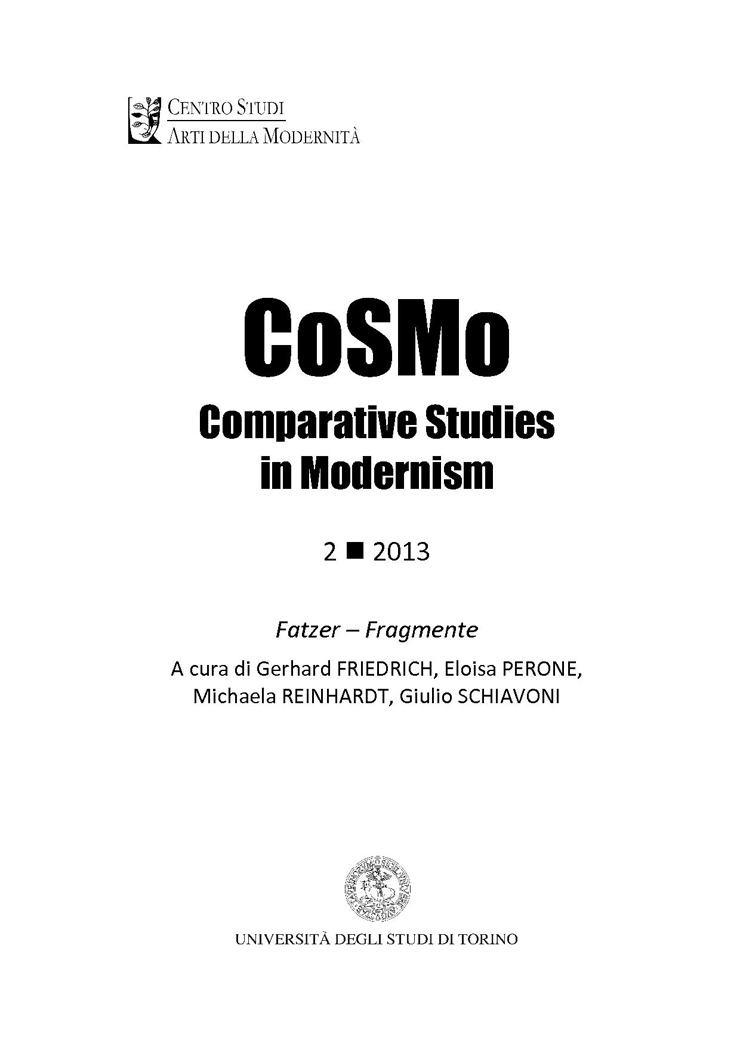Brecht, o il piacere di rischiare sul piacere. Note in margine al frammento-Fatzer
Abstract
Che si leggano o meno i testi di Brecht, in genere basta il suo nome a evocare tutta una serie di spettri che ne scongiurano una lettura seria: “politico”, “comunista”, “utopico”, e per completare il crescendo di anacronismi, “didattico”, sono sufficienti a suscitare in noi disincantati postmoderni, sedicenti post-ideologici, post-istorici e in fondo anche post-teatrali, un sorriso realistico. Peccato per la nostra idea di arte e di politica, giacché per Brecht non si è mai trattato di credere che l’arte o il pensiero potessero cambiare il mondo. Brecht non era così umanista e in fondo così “razzista” da credere che l’uomo potesse diventare migliore di quello che è. Mentre era abbastanza pratico da pensare che le cose, gli strumenti, le istituzioni, le opere potessero essere migliorati in ogni caso, e con ciò condizionare il comportamento degli uomini. “Tutto può migliorare, salvo l’uomo.” Il cosiddetto Fatzer-Fragment, testo per il teatro mai finito e tuttavia compiuto nella sua radicalità, mette alla prova l’“ideologia senza parole” incistata nei nostri gesti e atteggiamenti apparentemente più naturali, più impolitici, costringendo a rivedere il nostro senso di “politico”, “individuale”, “naturale” e di “piacere”. La domanda “che cosa ci piace, che cosa ci diverte” si mostra essere una domanda politica.
Whether one actually reads Brechts texts or not, normally a series of definitions pop up when he’s mentioned: “political”, “communist”, “utopic”, or even “didactical, just to recall a few of the terms that will only contribute to a lesser understanding of the author. These terms tend - in our post-modern disenchanted, self-proclaimed post-ideological and post-historical views - to evoke nothing but a realistic smile. Which is a pity for our idea of art and politics, as Brecht never intended to believe that art or thought might change the world. He was never so humanistic or so “racist” to really believe that the human being could become better than he is. But then he was practical enough to think that things, instruments, institutions, works could be bettered anyway and that these could then condition human behaviour. “Everything can get better, except the human being”. The so called Fatzer-Fragment – a never finishes text, although complete in its radicalism – challenges the “ideology without words” that is implanted in our apparently most natural and un-political gestures and attitudes, forcing us to redefine our idea of “political”, “individual”, “natural” and of “pleasure”. The question about “what we like” and “what amuses us” turns out to be a political one.
Downloads
Gli autori mantengono i diritti sulla loro opera e cedono alla rivista il diritto di prima pubblicazione dell'opera, contemporaneamente licenziata sotto una Licenza Creative Commons - Attribuzione che permette ad altri di condividere l'opera indicando la paternità intellettuale e la prima pubblicazione su questa rivista.








